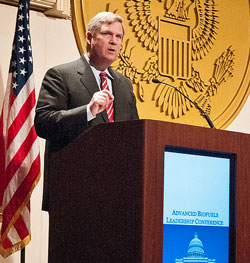Lights, camera, contest! The National Corn Growers Association’s (NCGA) Ethanol Committee wants high school and college students to submit their best videos showcasing ethanol.
The contest will allow students to create a video that, in two minutes or less, showcases five facts about ethanol. Videos can be submitted starting in early May until the final deadline which will be late in the fall of 2012. 
Winning videos will be posted on the NCGA YouTube site, promoted at state events, showcased at county fairs, aired during national meetings and, hopefully, will even ‘go viral’ for the general public to view. While generating ideas, potential contestants might want to consider these factors: ethanol’s environmental attributes, its renewability, how it decreases reliance on foreign oil, and the role ethanol plays in enhancing local economies.
“We are excited to launch this new project which will help connect our youth to corn-based ethanol, the fuel of the future,” said NCGA Ethanol Committee Chairman Chad Willis. “The innovative format of the submissions makes them ideal for placement on websites such as YouTube or for sharing through social mediums, including Facebook and Twitter. In marketing, they always say that it is crucial to reach your audience where they already are. In showcasing the benefits of this homegrown, sustainable fuel through new media, we are helping educate the next generation of a fuel option that can carry them forward.”
The video competition rules will be posted on the NCGA site and promoted to colleges and high schools throughout the nation by early May and again in late August/early September. All videos submitted will be the property of NCGA. For contest details, questions or to submit a competition name, please contact NCGA at keck@ncga.com.
A similar video contest was held by the Iowa Renewable Fuels Association (IRFA). View the winning video from the IRFA competition.


 As part of a larger strategy to promote soy biodiesel’s benefits among diesel users, the checkoff will once again co-sponsor the NTPA season of approximately 80 tractor pulls across the United States. The checkoff partners with the NTPA to increase biodiesel availability and use among pulling fans, many of whom work in the agricultural and trucking sectors.
As part of a larger strategy to promote soy biodiesel’s benefits among diesel users, the checkoff will once again co-sponsor the NTPA season of approximately 80 tractor pulls across the United States. The checkoff partners with the NTPA to increase biodiesel availability and use among pulling fans, many of whom work in the agricultural and trucking sectors. Dinneen says the approval of E15 by EPA means it’s now up to the industry to get the fuel out there for consumers. “We need to convince gasoline marketers to begin offering this fuel, and we need to let consumers know this is available to them,” he said in an interview with
Dinneen says the approval of E15 by EPA means it’s now up to the industry to get the fuel out there for consumers. “We need to convince gasoline marketers to begin offering this fuel, and we need to let consumers know this is available to them,” he said in an interview with 



 Agriculture Secretary Tom
Agriculture Secretary Tom  In stepping down as CEO, Broin says he wants to spend more time with his family and take on new challenges. “I will continue to be involved in strategic direction for the company as Executive Chairman of the Board, and leave the day-to-day operations to our very capable management team. I would not have done this had I not been convinced that the company would be in good hands. Under the leadership of Jeff Lautt and the entire management team at POET, I have confidence that the company will continue to lead the industry into the future.” Broin is married and has three children. In his more than two decades of leadership, POET has grown from 1 million gallons of ethanol that first year to an annual capacity in excess of 1.6 billion gallons.
In stepping down as CEO, Broin says he wants to spend more time with his family and take on new challenges. “I will continue to be involved in strategic direction for the company as Executive Chairman of the Board, and leave the day-to-day operations to our very capable management team. I would not have done this had I not been convinced that the company would be in good hands. Under the leadership of Jeff Lautt and the entire management team at POET, I have confidence that the company will continue to lead the industry into the future.” Broin is married and has three children. In his more than two decades of leadership, POET has grown from 1 million gallons of ethanol that first year to an annual capacity in excess of 1.6 billion gallons. “For the past 25 years, Jeff Broin has led POET and the entire ethanol industry,” said Lautt. “He has grown POET from one small plant to a leadership position in the global renewable fuels industry. With the help of the entire team at POET, I will do my best to continue building on the success the company has achieved.”
“For the past 25 years, Jeff Broin has led POET and the entire ethanol industry,” said Lautt. “He has grown POET from one small plant to a leadership position in the global renewable fuels industry. With the help of the entire team at POET, I will do my best to continue building on the success the company has achieved.”